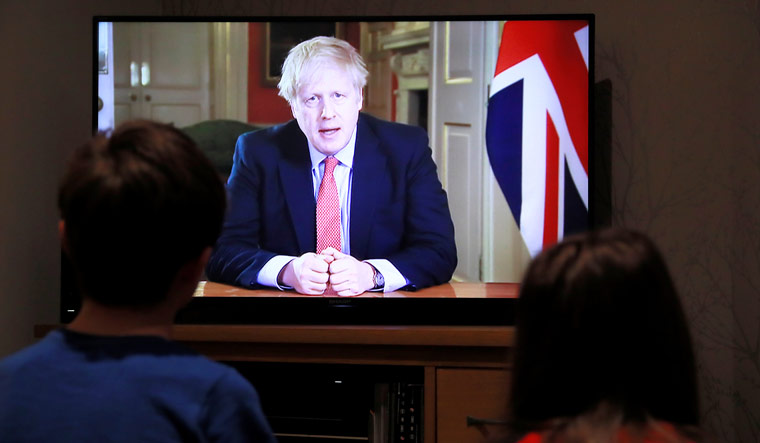Pressure mounted on the UK government to launch an independent public inquiry into the reasons behind the higher risk faced by ethnic minorities, including Indians, in the country from the coronavirus. In a letter to British Prime Minister Boris Johnson on Sunday, a coalition of around 70 prominent figures from the UK's black, Asian and minority ethnic (BAME) backgrounds said that COVID-19 has highlighted race and health inequality issues in Britain. They warn that the ongoing government review, led by Public Health England, into the factors behind the disproportionate impact of the deadly virus on BAME groups lacks transparency. "Only an independent public inquiry will provide the answers we need. Such an inquiry is essential for all, especially for those who have lost loved ones as a result of the pandemic," stated the letter signed by BAME activists, artists and faith leaders.
What do studies say?
A recent report by the Office of National Statistics (ONS) in Britain had underlined the ethnic faultlines in the coronavirus fatalities in the country. Taking age into account, Black males were 4.2 times more likely to die from a COVID-19-related death and Black females were 4.3 times more likely than White ethnicity males and females. People of Bangladeshi and Pakistani, Indian, and mixed ethnicities also had statistically significant raised risk of death involving COVID-19 compared with those of White ethnicity.
Take the numbers: According to ONS data, Indians account for 483 or 3.77 per cent of all the coronavirus deaths in the UK. Indians are the largest ethnic minority group in the UK with over 1.5 million people, making up 2.3 per cent of the total UK population. Bangladeshis and Pakistanis together accounted for 386 or 3.01 per cent of the total deaths, and people of Black origin accounted for 766 or 5.98 per cent of the total deaths.
National Health Service (NHS) figures corroborate the ONS numbers. Figures released show that, of the 13,918 patients who died in hospitals till April 17 after testing positive for the novel coronavirus, 16.2 per cent were of black, Asian and minority ethnic (BAME) background and those identifying with Indian ethnicity made up 3 per cent of that. This was followed by Caribbeans as the second-largest ethnic group affected in the COVID-19 death toll at 2.9 per cent, followed by Pakistanis at 2.1 per cent.
Why are the deaths happening disproportionately?
The ONS report has tied the socio-economic position of various ethnicities in the UK to the casualty counts. The 2019 Annual Population Survey data suggested the Bangladeshi and Pakistani community increased by approximately 17 per cent, and the Black community by 19 per cent; but, the percentage of the population in higher managerial and professional occupations remained relatively constant, implying little social mobility since the census.
Bangladeshi and Pakistani ethnic groups were the most likely to be classified as "never worked or long-term unemployed", according to the report. Also, while only 2 per cent White British households experienced overcrowding, it was 30 per cent of Bangladeshi households (the highest percentage), 16 per cent of Pakistani households and 12 per cent of Black households. 8 per cent among those of Bangladeshi or Pakistani ethnicity were unemployed, compared to 9 per cent of those with Black ethnicity. All these factors, according to ONS, leads to poorer health outcomes.
However, the Indian death count is an anomaly, as the community is largely placed in the higher socio-economic strata. People with Indian ethnicity were twice as likely to be classified to the most advantaged higher managerial and professional socio-economic class than those with either Bangladeshi or Pakistani ethnicity. Only 4 per cent of the White and Indian ethnic populations are unemployed, the lowest in the country. Also, the highest educational attainment at GCSE and degree levels was among those of Chinese and Indian ethnicity. One explanation provided was that a large number of Indians were employed as medical professionals in the NHS, putting them at higher risk of contracting the virus.
Calls for investigation
BAME groups called for an inquiry to provide a comprehensive exploration of all possible contributing factors that could explain the outsized effect COVID-19 has on their communities. The correspondence with 10 Downing Street also calls for the inquiry to probe the "level of exposure" to COVID-19 of BAME staff working in the National Health Service (NHS) and the social care sector, as well as key workers across both the public and private sectors.
As the figures came, London Mayor Sadiq Khan called for ethnicity to be recorded on death certificates to expose the disproportionate effect that COVID-19 and other illnesses are having on the UK capital's BAME communities. "We need to fully expose the effect it is having on our communities, have honest conversations about what is behind it, why it is happening, and work hard to tackle these problems. That's why I'm calling for greater transparency and bringing city leaders together to see what we can do," said the Pakistani-origin mayor.
The UK government had launched a Public Health England led review into the factors behind the ethnic disparity in COVID-19 deaths last month, with the opposition Labour Party conducting its own research on the issue. The Research and Innovation Forum of the British Association of Physicians of Indian Origin (BAPIO) had found in a survey that medical and healthcare professionals from Indian and minority ethnic backgrounds similarly fall into a higher risk category of dying from the novel coronavirus in the UK. BAPIO has been among the many medical associations lobbying the government for steps to protect this vulnerable category of the National Health Service (NHS) workforce.


